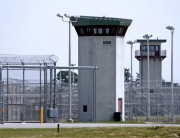Gov. Jerry Brown is still trying to figure out how to deal with the state's overcrowded prisoner population.
As it stands, California is under court order to trim an additional 9,600 detainees from its prisons before the end of the year. Sheriffs departments from all over the state are calling this a bad and dangerous move.
The best of the worst have already had their sentences trimmed, they said, and releasing nearly 10,000 felons onto the street will have a huge impact on public safety.
Brown's most recent plan involved sending these inmates to private prisons or county jails that have extra room. In order to get the final green light, it would have needed approval from Sacramento legislators. Senators have said the idea was shot down before it even crossed their desks.
The primary issue, they said, is cost. Sending inmates to private prisons would be very expensive, and California isn't in the business of printing money. Senators have pointed out that in the first two years alone, this would cost more than $730 million.
The governor is requesting that money be taken from the state's reserve fund. Elected officials have laughed off the request.
Brown is now reportedly asking federal judges to extend his year-end deadline. It's unclear when that decision will come down, and whether the request will even be considered. They have already said no once.
The judges have remained steadfast in their ruling that overcrowded conditions are violating inmates Constitutional rights. It hurts access to medical care and mental health care, they said, and the population need to be capped at 137.5% of capacity. Anything beyond that is unacceptable.
Assembly Speaker John Perez, however, thinks Brown's request warrants a second look. It's not idea, he said, but it may be the best course of action, especially since there aren't a lot of other options. They have also shot down releasing inmates which has turned this into a rock and a hard place situation.
Legislators are hoping the federal judged will show some compassion. They are asking for a three to five year extension. This will allow counties to establish drug rehabilitation programs and mental health treatment facilities. This will help reduce recidivism and lower crime.
Attorneys for the inmate plaintiffs in the prison overcrowding lawsuit say they're open to the idea. They see the plan as the best way to approach and fix inmate overcrowding. At the same time, they want more control over the implementation time frame.
Law makers feel this point should be non negotiable. Plaintiff attorneys are not the best party to be making decisions that impact public safety. They have not yet said how they will try to deal with the current impasse.
Negotiations are ongoing.















Follow Us
Facebook
Twitter
Google +1
LinkedIn
Youtube